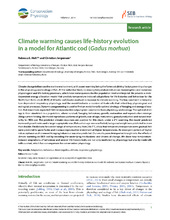| dc.contributor.author | Holt, Rebecca E. | eng |
| dc.contributor.author | Jørgensen, Christian | eng |
| dc.date.accessioned | 2015-04-28T14:45:53Z | |
| dc.date.available | 2015-04-28T14:45:53Z | |
| dc.date.issued | 2014 | eng |
| dc.identifier.issn | 2051-1434 | en_US |
| dc.identifier.uri | https://hdl.handle.net/1956/9849 | |
| dc.description.abstract | Climate change influences the marine environment, with ocean warming being the foremost driving factor governing changes in the physiology and ecology of fish. At the individual level, increasing temperature influences bioenergetics and numerous physiological and life-history processes, which have consequences for the population level and beyond. We provide a statedependent energy allocation model that predicts temperature-induced adaptations for life histories and behaviour for the North-East Arctic stock (NEA) of Atlantic cod (Gadus morhua) in response to climate warming. The key constraint is temperature- dependent respiratory physiology, and the model includes a number of trade-offs that reflect key physiological and ecological processes. Dynamic programming is used to find an evolutionarily optimal strategy of foraging and energy allocation that maximizes expected lifetime reproductive output given constraints from physiology and ecology. The optimal strategy is then simulated in a population, where survival, foraging behaviour, growth, maturation and reproduction emerge. Using current forcing, the model reproduces patterns of growth, size-at-age, maturation, gonad production and natural mortality for NEA cod. The predicted climate responses are positive for this stock; under a 2°C warming, the model predicted increased growth rates and a larger asymptotic size. Maturation age was unaffected, but gonad weight was predicted to more than double. Predictions for a wider range of temperatures, from 2 to 7°C, show that temperature responses were gradual; fish were predicted to grow faster and increase reproductive investment at higher temperatures. An emergent pattern of higher risk acceptance and increased foraging behaviour was also predicted. Our results provide important insight into the effects of climate warming on NEA cod by revealing the underlying mechanisms and drivers of change. We show how temperatureinduced adaptations of behaviour and several life-history traits are not only mediated by physiology but also by trade-offs with survival, which has consequences for conservation physiology. | en_US |
| dc.language.iso | eng | eng |
| dc.publisher | Oxford University Press | en_US |
| dc.rights | Attribution CC BY | eng |
| dc.rights.uri | http://creativecommons.org/licenses/by/4.0/ | eng |
| dc.subject | Adaptation | eng |
| dc.subject | Behaviour | eng |
| dc.subject | bioenergetics | eng |
| dc.subject | Climate | eng |
| dc.subject | respiratory physiology | eng |
| dc.title | Climate warming causes life-history evolution in a model for Atlantic cod (Gadus morhua) | en_US |
| dc.type | Peer reviewed | |
| dc.type | Journal article | |
| dc.date.updated | 2015-04-09T06:25:17Z | en_US |
| dc.description.version | publishedVersion | en_US |
| dc.rights.holder | Copyright 2014 The Authors | en_US |
| dc.source.articlenumber | cou050 | |
| dc.identifier.doi | https://doi.org/10.1093/conphys/cou050 | |
| dc.identifier.cristin | 1197181 | |
| dc.source.journal | Conservation Physiology | |
| dc.source.40 | 2 | |
| dc.source.14 | 1 | |
| dc.subject.nsi | VDP::Mathematics and natural scienses: 400::Basic biosciences: 470::Bioinformatics: 475 | en_US |
| dc.subject.nsi | VDP::Mathematics and natural scienses: 400::Zoology and botany: 480::Ecology: 488 | en_US |
| dc.subject.nsi | VDP::Matematikk og naturvitenskap: 400::Basale biofag: 470::Bioinformatikk: 475 | nob |
| dc.subject.nsi | VDP::Matematikk og naturvitenskap: 400::Zoologiske og botaniske fag: 480::Økologi: 488 | nob |

